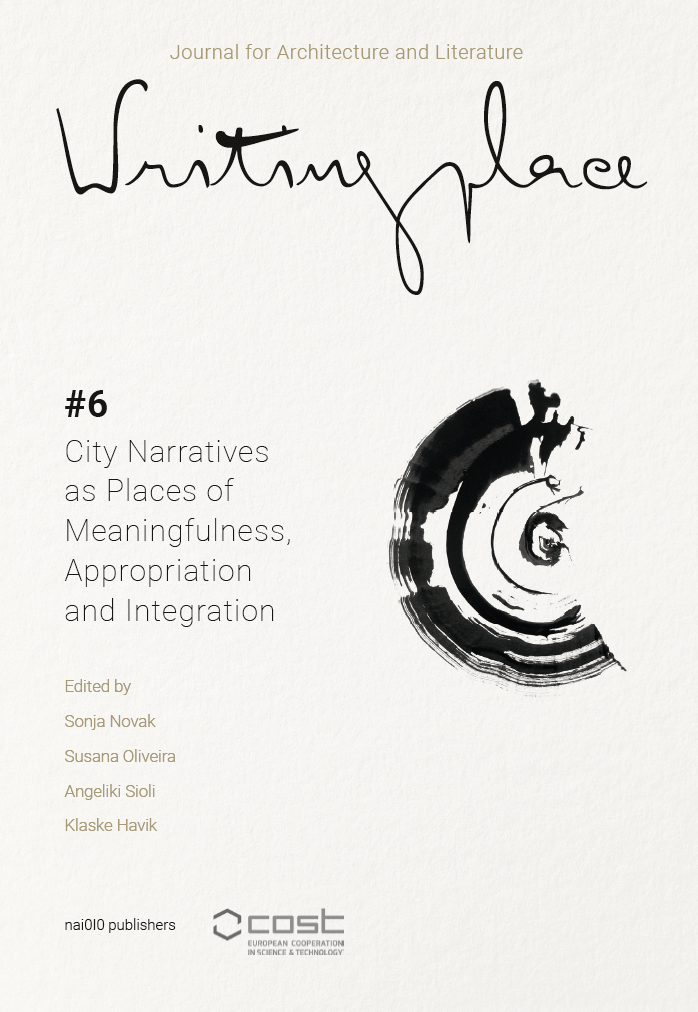Narrating the Urban Fabric of our Historical Towns
DOI:
https://doi.org/10.7480/writingplace.6.6359Abstract
This article explores informal expressions of cultural heritage in historical towns. The framework in historical urban settlements uses research to analyse the entanglements of urban heritage when surveyed as environments where subcultures and minorities inhabit and create those sites. The approach challenges the idealistic constructed scenarios of the past and provides space for new interpretations on the cultural diversity of the unplannable or informal in place-making. This paper examines the heritage conservation paradox on how historical values can better incorporate past and contemporary anthropological informalities.
References
John Pendlebury, ‘Conservation Values, the Authorised Heritage Discourse and the Conservation-Planning Assemblage’, International Journal of Heritage Studies 19/7 (2013), 709-727.
Ana Pereira and Francesco Bandarin, Reshaping Urban Conservation: The Historic Urban Landscape Approach in Action (Singapore, 2019).
Ataa Alsalloum, ‘Rebuilding and Reconciliation in Old Aleppo: The Historic Urban Landscape Perspectives’, in: ibid., 57-78.
Lisanne Gibson and John Pendlebury, Valuing Historic Environments (London/New York, 2009), 111.
Robert Adam, ‘Lessons from History in the Conservation of Historic Urban Landscape’, in: Ron van Oers and Sachiko Haraguchi (eds.), Managing Historic Cities: World Heritage Papers 27 (Paris, 2010), 81-88.
UNESCO, Convention Concerning the Protection of the World Cultural and Natural Heritage (Paris, 1972); UNESCO, Recommendation Concerning the Safeguarding and Contemporary Role of Historic Areas (Nairobi, 1976).
Juan A. García-Esparza, ‘Are World Heritage Concepts of Integrity and Authenticity Lacking in Dynamism? A Critical Approach to Mediterranean Autotopic Landscapes’, Landscape Research 43/6 (2018), 817-830.
Pablo Altaba and Juan A. García-Esparza, ‘The Heritagization of a Mediterranean Vernacular Mountain Landscape: Concepts, Problems and Processes’, Heritage & Society 11/3 (2018), 189-210.
Juan A. García Esparza, Local Character Assessment: Artisans, Crafts and the Historic Environment of Penyagolosa, Spain (Rome, 2021).
Manal Ginzarly, Ana Pereira and Jaques Teller, ‘Mapping Historic Urban Landscape Values through Social Media’, Journal of Cultural Heritage 36 (2019), 1–11; UNESCO, The HUL Guidebook: Managing Heritage in Dynamic and Constantly Changing Urban Environments: A Practical Guide to UNESCO’s Recommendation on the Historic Urban Landscape (2016). Available online at: gohulsite.files.wordpress.com/2016/10/wirey5prpznidqx.pdf (accessed 24
June 2021).
Loes Veldpaus and Helma Bokhove, ‘Integrating Policy: The Historic Urban Landscape Approach in Amsterdam’, in: Pereira and Bandarin, Reshaping Urban Conservation, op. cit. (note 2), 111-122.
Sian Jones and Steven Leech, Valuing the Historic Environment: A Critical Review of Existing Approaches to Social Value, AHRC Cultural Value Project Report (Manchester, 2015).
Mike Crang and Penny S. Travlou, ‘The City and Topologies of Memory’, Environment and Planning D: People and Space 19/2 (2001), 161-177; Mads Daugbjerg and Thomas Fibiger, ‘Introduction: Heritage Gone Global: Investigating the Production and Problematics of Globalised Pasts’, History and Anthropology 22 (2011), 135-147; Tim Edensor and Mark Jayne (eds.), Urban Theory beyond the West: A World of Cities (London, 2012).
Veldpaus and Bokhove, ‘Integrating Policy’, op. cit. (note 12).
Bjarke Nielsen, ‘UNESCO and the “Right” Kind of Culture: Bureaucratic Production and Articulation’, Critique of Anthropology 3/4 (2011), 273-292.
Pendlebury, ‘Conservation Values’, op. cit. (note 1).
Rodney Harrison, ‘Beyond “Natural” and “Cultural” Heritage: Toward an Ontological Politics of Heritage in the Age of Anthropocene’, Heritage & Society 8/1 (2015), 24-42.
Andreas Reckwitz, ‘Toward a Theory of Social Practices: A Development in Culturalist Theorizing’, European Journal of Social Theory 5/2 (2002), 243-263.
Juan A. García-Esparza and Pablo Altaba, ‘A GIS-based Methodology for the Appraisal of Historical, Architectural and Social Values in Historic Urban Cores’, Frontiers of Architectural Research 9/4 (2020), 900-913.
L. Harald Fredheim and Manal Khalaf, ‘The Significance of Values: Heritage Value Typologies Re-examined’, International Journal of Heritage Studies 22/6 (2016), 466-481.
Ana Pereira, ‘The Historic Urban Landscape Approach in Action: Eight Years Later’, in: Pereira and Bandarin, Reshaping Urban Conservation, op. cit. (note 2), 21-54.
Downloads
Published
Issue
Section
License
Copyright (c) 2022 Juan A. García Esparza

This work is licensed under a Creative Commons Attribution 4.0 International License.


